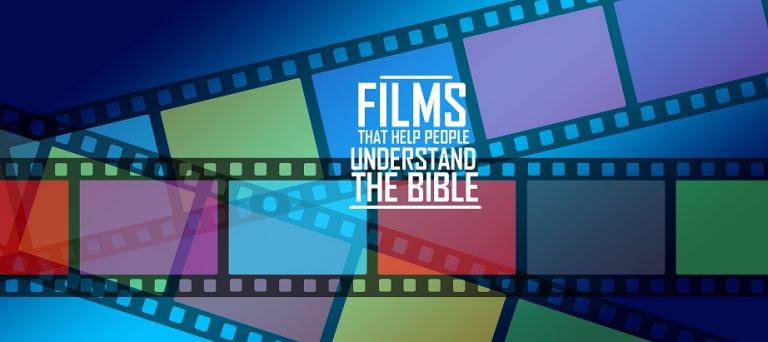
Are there any films helpful for understanding Scripture?—Yes, there are!
Last week, we looked at why popular Bible movies and shows, such as “The Chosen,” fail to “get” Jesus. This is true because, despite their artistic merits, these films almost always present a Jesus congenial to mainstream U.S. culture. In other words, they commit identity theft on the real Jesus, substituting a counterfeit-Jesus that buys American cultural values.
Are there any films helpful to people wanting to better understand Scripture? Here is a video presentation on that—
https://www.youtube.com/watch?v=cPHUG9VFtYI&t=7s
Two Types of Films To Understand Scripture
Dr. John Pilch discusses two types of helpful films for U.S. Bible readers to better understand Scripture. With them, we can rid ourselves of incorrect scenarios distorting our Bible reading, preventing the biblical authors from communicating what they really mean to say. These helpful films Pilch offers create appropriate cultural scenarios. Through these, we might imagine rightly what the sacred authors envisioned and presuppose.
To this end, Pilch offers us two educational films and seven recreational films. Let’s explore them.
Educational Films: “Family Matters”
First off are the educational films Pilch recommends. Pilch explains that these are film/video presentations informed by scholarly anthropological fieldwork and research.
Among these helpful films, Pilch’s first suggestion comes from the Encyclopedia Britannica Education Corporation’s “Middle East” series. It is part four of the series, entitled “Family Matters: The Role of the Family in the Middle East.” As you can see from the link above, as film preservation goes, it is in pretty bad shape. But content-wise, the almost-25 minute “Family Matters” still holds up as an excellent educational film.
“Family Matters” explores and explains the history behind the basic social structure of the Middle Eastern family, namely extensive patriarchal kinship groups.
“Family Matters” explores what hospitality means in the Middle East, who gives it, and to whom it is given. This sheds light on when hospitality is featured in Scripture (Genesis 19:1-29; Matthew 10:5-15). The Matthean Jesus promised a terrible fate for those who fail to give Middle Eastern hospitality (Matthew 25:31-46).
Another crucial aspect of Middle Eastern life illuminated by “Family Matters” is the ideal marriage partner being the patrilateral first cousin (one’s father’s brother’s daughter). That is the ideal biblical marriage partner, folks. With this understanding, you can read both the Genesis stories about the Patriarchs and the Gospel stories about Mary and Joseph in culturally plausible ways.
Educational Films: “Kypseli”
Another of these helpful films Pilch offers is educational—Kypseli: Women and Men Apart—A Divided Reality. Forgive the terrible quality of the videos linked above. (If someone can find a better-preserved version of this forty-five-minute video, I would greatly appreciate it!)
Kypseli is a traditional peasant village on Santorini, a Greek island. Researcher Susanna M. Hoffman studied the residents of Kypseli there, and her findings are presented in this film. Suppose you’d like an honest picture of the cultural values and the sharply gender-divided world of Jesus (John 4:4-42). In that case, “Kypseli” will provide it.
Pilch advises watching “Kypseli” with the sound off. Try interpreting what you are seeing without narration (which sometimes, instead of reporting, interprets the goings-on). Pilch admits that many Westerners who watch “Kypseli” find it repulsive and unbelievable. Consider that if that’s how the world of Jesus was, and you’re not reacting that way while watching your favorite Jesus movie, doesn’t that mean something is off?
Friends, you will be forced to reevaluate your favorite Jesus Movies/Bible films after watching these two educational films. It shouldn’t affect your love for these productions as films. But you won’t fool yourself into thinking these and other Bible flicks present historical and cultural verisimilitude.
Recreational Films: Hollywood Bible Spectacles Are NOT Helpful
Now let’s talk about recreational films. Among these, one finds a plethora of Hollywood spectacles, Bible movies like “The Ten Commandments” and “Quo Vadis.” We are not going to be discussing these for now. Frankly, they aren’t very honest with Scripture or helpful in building bridges of understanding the Bible. “Pius imagination” and spurious familiarity have a field day in the sketchy, high context documents of Scripture. I’m looking at you both, Mel Gibson and Ron Howard!
But John Pilch says that other recreational or entertaining films do help people understand Scripture. Ironically, these films are not religious nor explicitly related to the Bible.
Recreational Films: “The Gods Must Be Crazy.”
One excellent recreational film in this regard is “The Gods Must Be Crazy.” Set in southern Africa, the protagonist of this 1980 comedy is a hunter-gatherer named Xi (pronounced “ki”). Xi lives with his tribe in the Kalahari Desert.
Pilch encourages Western Bible readers to watch “The Gods Must Be Crazy” with a pen and notepad handy. He says we should record Xi’s beliefs and behaviors, noting how different they are from their own beliefs and behaviors. For Bible readers, Pilch observes, it is eye-opening to see the impact culture has on how human beings perceive, think about, understand, and communicate reality.
Just as Xi does not understand nature and time the way American Christians invariably do, so also neither did our biblical ancestors in the faith. Neither did Jesus, by the way.
Throughout “The Gods Must Be Crazy,” many screwball comedic scenes play out, showing cross-cultural confusion in communications, both verbal and non-spoken. One character, in particular, is like a living symbol of spurious familiarity. This condition plagues the vast majority of American Bible readers.
Recreational Films: “Prizzi’s Honor”
Next up, Pilch offers John Huston’s crime comedy, “Prizzi’s Honor.” Though set in the late 20th-century, the film showcases the enduring Mediterranean values of honor and shame. Bible readers who watch this film ought to pay attention because honor and shame can be found on every page of Scripture.
Charlie Partanna (Jack Nicholson) has been socialized to put nothing before honor, not even his life or wife, the outsider, Irene Walcewicz (Kathleen Turner). So what happens when a conflict arises between the Family Business and the crooked wife he loves? As in the Bible, honor (found explicitly 349 times in the Revised Standard Version and implied thousands of times more) always wins. Pilch explains that “Prizzi’s Honor” can help American Christians genuinely understand the meaning of the commandment, “Honor your father and your mother.”
Recreational Films: “The Godfather” Trilogy
There is perhaps no better film to teach Americans more about Scripture than “The Godfather” Trilogy. In fact, you can learn more about the Bible from one watching of “The Godfather” movies than a thousand hours spent in most so-called American Bible study programs.
Like “Prizzi’s Honor,” “The Godfather” films also showcase Mediterranean honor and shame. But added to that is a particular focus on the crucial Mediterranean concept of patronage. A patron, or “Godfather,” is an important analogy for the New Testament concept of the God of Israel.
What is a Mediterranean patron? He or she is someone with surplus and thus obligated to share his or her extra with the needy as if they were kin. But, as Pilch explains, patrons are not bound to treat everyone as if they were family. They are free to choose whom they wish as clients. This plays into the parables of Jesus as they evolved into the Gospel communities (Matthew 20:1-16).
Abba & Favors
Indeed, one cannot properly understand Jesus calling God “Abba, Father!” apart from Mediterranean patronage. The same goes for “Father” in the “Our Father.” Jesus wasn’t imagining an American daddy or Santa Claus figure when he called God “Abba” (Mark 14:36; see also Proverbs 13:24; 19:18; 22:15; 23:13-14; 29:15, 17, 19; Sirach 30:1-13). Instead, he was calling his God a Mediterranean Patron, someone a lot like a Don Vito Corleone in the sky-vault.
Pilch explains that this ties in with grace, in Greek χαρις (charis), meaning “favor,” as in the favors granted by a Mediterranean patron. The Latin translation is gratia, hence grace. Can you have a theology of grace without first having Mediterranean culturally-specific knowledge of patronage? Not really. That is the foundation. “The Godfather” movies help us Westerners see this.
Recreational Films: “El Abuelo”
Pilch also recommends “El Abuelo” (“The Grandfather”) among his list of films. This foreign film dives into the intricacies of Mediterranean honor in Spain. As Pilch says, it portrays these honor-patterns in endlessly surprising twists in the primary storyline. “El Abuelo” shows how honor’s enigmatic character is actually lived in the everyday Mediterranean world.
Pilch says that U.S. Christian viewers need to pay close attention to the reversals going on throughout “El Abuelo.” They can help us appreciate Jesus, who, especially in the Beatitudes (Matthew 5:3-10), redefines his Mediterranean culture’s honor-code. Contrary to popular belief, Jesus was not countercultural. Instead, Jesus was counter-structural—he was still very much all about honor and honoring God. It’s just he turned his cultural world on its head concerning what was honorable (Acts 17:6).
Recreational Films: “Wedding in Galilee”
Finally, Pilch offers another foreign film to help U.S. Bible readers better understand what they are reading. Despite its name, “Wedding in Galilee” is not an adaptation of a biblical story. But it does offer important insights into biblical family structures and customs.
https://www.youtube.com/watch?v=ggyOqY1mBbk&t=927s
“Wedding in Galilee” is set around 1987 in the West Bank. It concerns a Palestinian father and mukhtar (“village chief” and patron or “Godfather” figure) who wishes to celebrate a traditional wedding for his son and “daughter” (really his niece). But he needs the permission of the occupying Israeli authorities. Otherwise, it can’t happen. The mukhtar accomplishes this feat in very clever ways native to the cultural world of Scripture.
Pilch explains that in “Wedding in Galilee,” honor and shame dance in endless variations. You see it in public contests of push and shove and in how characters behave. The film shows how Middle Eastern children constitute the gossip network. Pilch explains that, as in “Wedding in Galilee,” youngsters in that part of the world snoop everywhere, seeing everyone’s dirty laundry and report embarrassing details back to parents. Pilch says that knowing that gives the proper context to Jesus’ words in Matthew 19:14. Besides healing the sick youngsters, Jesus also had nothing to hide from the gossip network.
“Wedding in Galilee” also provides essential cultural background to the Wedding parables of Jesus. It also illuminates the Wedding at Cana story in John 2 and what Joseph faced upon learning that his betrothed was pregnant (Matthew 1:18-25).
Conclusion
So these are some films that can help American Bible readers see the Scriptures with culturally-plausible scenarios. Next time, we will explore a few Bible movies that seriously challenge the complacent theology of verbal orthodoxy.
















